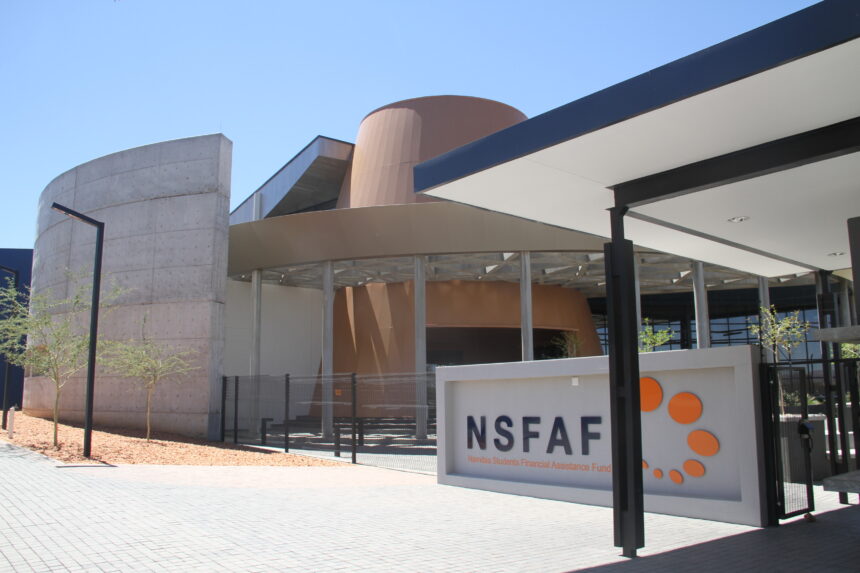Rudolf Gaiseb
Deputy higher education minister Natalia Goagoses announced that the Namibia Students Financial Assistance Fund (NSFAF) will do away with means-testing, an eligibility factor for students to be funded by them.
In essence, the playing field will then be levelled as one’s economic status will no longer be a criterion for student funding.
Speaking at the 2025 NSFAF online application launch on Tuesday, the deputy minister said the amended NSFAF policy is a paradigm shift from a loan scheme which has been a pro-poor student funding system to an inclusive multi-optional students loan system (IM-OSLS).
“It aims to fund eligible Namibians from all walks of life to access higher education and training, and accelerate the acquisition of requisite knowledge and technical skills in approved priority fields of study and areas of acute skills’ deficits,” she noted.
Sustainability
Commenting on the possible adjustment to NSFAF’s policy, independent economic researcher Joseph Sheehama said the fund should continue operating under the current framework, which assesses applications to establish financial aid eligibility.
“The threshold plays an important role in identifying which students are qualified. How can you help a minister or someone’s child who can afford to apply for student loans or other bank facilities, and leave the child of a parent selling kapana at the open market?” he asked.
He added that those earning high salaries will save money because the NSFAF already covers their children’s educational costs, exacerbating income inequalities.
“Giving students from middle-class to upper-class families financial aid will put children of low-income-earners at a disadvantage,” he emphasised.
Welcome
Popular Democratic Movement (PDM) member of parliament Maximilliant Katjimune – a staunch advocate of free education – welcomed the development.
“We have always been of the view that higher education should be accessible, of quality, and equitable. Preferably, all students registered with an accredited institution must have access to funding,” he said.
“We hope this is not political mimicking on the part of the deputy minister because we have encountered situations in the past where the Fund announced progressive interventions, only for the minister of finance to counter that by saying there is no money to fund all students.
Therefore, policy must be made with reference to capital, which I hope NSFAF and treasury have reconciled”, Katjimune stated. NSFAF acting chief executive officer Kennedy Kandume said the multi-optional student loan system is only a proposed policy, and has not been implemented yet as it needs to be approved after relevant consultations.
He hinted that it would need a significant financial adjustment, as the whole budget will need to be revised.
“We project that if we implement the new Inclusive Multi-Optional Students Loan System, the fund would need more than N$3 billion, as the number of new students is expected to increase to more than 30 000. This is a significant jump, compared to the expected normal increase of 24 098 new students,” he continued.
During the 2024 academic year, the fund received and reviewed a total of 31 144 loan applications, of which 8 805 were rejected due to eligibility issues, leaving a total of
22 339 successful applicants, which represents 72% of the total applications.
Of the 22 339 successful applicants, 12 924 (58%) were female, while male applicants were 9 415 (42%).
In terms of the level of studies, 72% or 16 063 students were funded to study at the undergraduate level, while 5 970 (26.7%) were to study at the Technical and Vocational Education Training (TVET) level, and 306 went to pursue post-graduate studies.
Kandume said working on a budget of N$2.5 billion, the fund was able to support
53 793 beneficiaries, both continuing and new students, during the 2024 academic year. “This is an increase of 18.3% from 45 464 (continuing and new intakes) students supported during the 2023 academic year,” he said. Kandume said it is thus irrational to fund students whose parents are financially challenged equitably with those whose parents earn well.
Model
The IM-OSLS system also expands loan funding options to Recognition of Prior Learning (RPL), funding of certificates at NQF level 5, and articulation funding into diplomas, bachelor’s degrees and vocational training levels.
This encompasses funding after the completion of the bridging and readiness programmes and repeaters, including giving a second chance to those who failed.
“The limited financial resources and the increasing number of students, presenting different conditions, gave impetus to the rethinking of the funding strategy to broaden funding options to enable more students to access tertiary education,” Goagoses said.
The proposed policy decision will be determined this year.
-rrgaiseb@gmail.com



